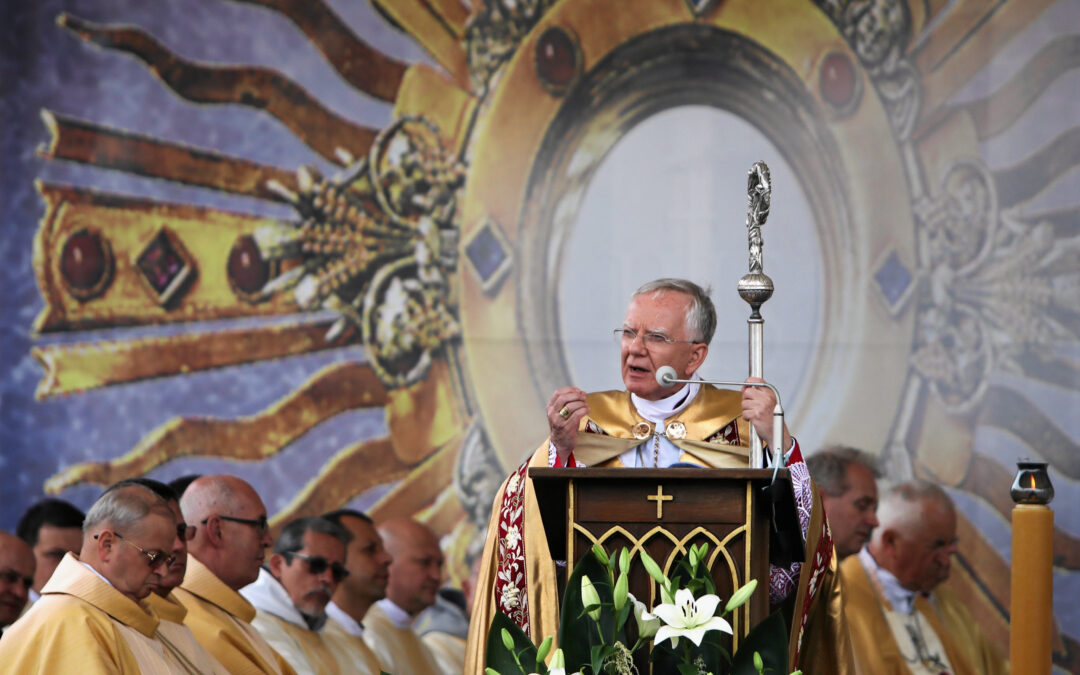Brussels, Berlin and New York are seeking to “impose a neo-Marxist vision of a new order” on Poland, including the “so-called rule of law” and “LGBT ideology”, warns one of the country’s most senior bishops.
His comments come as Poland’s government is blocking the European Union’s budget due to the inclusion of a mechanism linking funds to the rule of law. They also follow growing criticism of the Polish church’s involvement in political issues.
Speaking during a mass at Wawel Castle in Kraków, the city’s archbishop, Marek Jędraszewski, likened today’s situation to that of 100 years ago.
Then, he noted, the world was also recovering from a pandemic, Spanish flu. At the same time, it was threatened by the ideological onslaught of Bolshevism, which was seeking to expand out of Russia, spreading an atheistic vision of the world, including the idea of abortion on demand.
Today there is once more a “neo-Marxist vision of a new order that rejects God’s kingdom” being “imposed by important centres of the modern world: Brussels, Berlin, New York”, warned Jędraszewski.
It aims to “replace God with…material desires”, said the archbishop. Its vision “proclaims undefined European values and the so-called ‘rule of law’, behind which is abortion as a woman’s right”.
It also “wants to introduce by force gender and LGBT ideology in preschools, so-called ‘gay marriage’, and the adoption of children by [such couples]”, continued Jędraszewski.
The archbishop of Kraków has been a vocal figure in the church, including on issues related to the ruling Law and Justice (PiS) party’s conservative agenda.
Last year, Jędraszewski, like the government, condemned what they call “LGBT ideology”. He described it as a “rainbow plague” and likened it to Bolshevism and Nazism.
Parts of the church recently supported the collection of signatures in support of a legislative proposal to ban LGBT parades in Poland. After receiving more than double the requisite 100,000 signatures, it was submitted to parliament earlier this month, where it must now be considered by MPs.
Earlier this year, Jędraszewski was chosen by Poland’s Catholic episcopate as the chairman of the Joint Commission of the Government and the Episcopate, meaning that he now leads the church’s relations with the government.
The church retains a powerful influence on public life in Poland, a country where over 90% of the population are officially classified as Catholic.
It also has the strong support of PiS. The party’s chairman, Jarosław Kaczyński, describes the church as the “repository of the only moral system commonly known in Poland”. He warns that, without it, the only alternative is “nihilism”.
The church’s position has, however, come under increasing challenge, amid revelations of sex abuse by priests and alleged cover-ups by their superiors. There has also been criticism of its perceived attempts to influence politics, including through sermons from the pulpit.
A poll earlier this year showed that the church had seen a greater decline in trust than any other major institution in Poland. Another, published this month, found that only 35% of Poles now have a positive view of the church, while among young people the proportion is just 9%.
Current protests against a constitutional court ruling that introduces a near-total ban on abortion have targeted the church, which has long demanded a prohibition of abortion and has criticised the government for failing to introduce one.
Main image credit: Jakub Porzycki / Agencja Gazeta

Daniel Tilles is editor-in-chief of Notes from Poland. He has written on Polish affairs for a wide range of publications, including Foreign Policy, POLITICO Europe, EUobserver and Dziennik Gazeta Prawna.




















